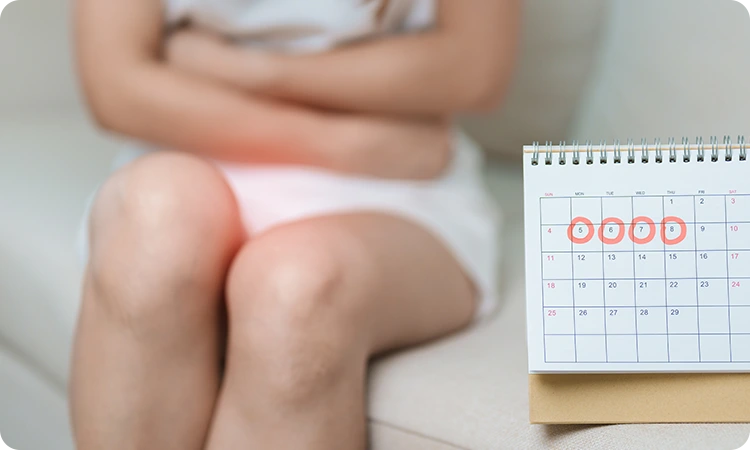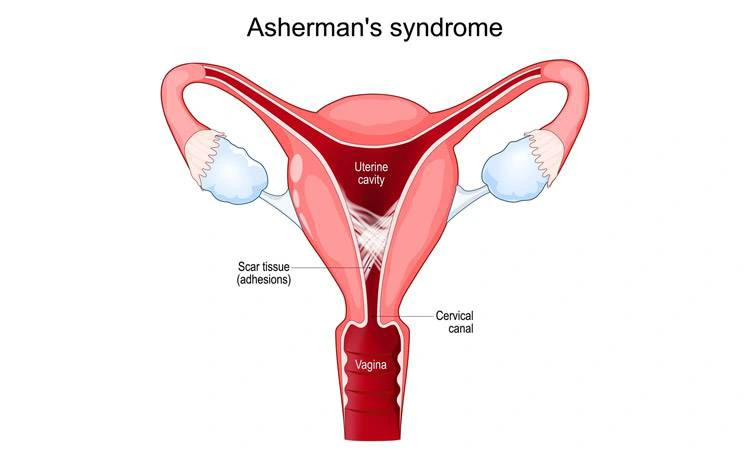Gynecology & Pregnancy Care
- Home
- »
- Ayurveda Speciality
- »
- Gynecology & Pregnancy Care
Gynecological Diseases Treatment & Pregnancy Care in Dubai
PCOD / PCOS

PolyCystic Ovarian Syndrome is a condition that has cysts on the ovaries that restrict the ovaries from functioning normally. Insulin resistance and excessive production of androgens (male hormones), particularly testosterone are the chief culprits. This results in high levels of luteinizing hormone (LH) and low levels of follicle-stimulating hormone (FSH) which prevents follicles from producing/releasing a mature egg, irregular menstruation, excessive hair growth, obesity and enlarged ovaries with multiple small cysts and thick outer covering.
In Ayurveda the treatment principle for PCOS is to clear obstruction in the pelvis, normalize metabolism and regulate the menstrual system. Treatment is focused to reduce Kapha which is causing obstruction in the normal menstrual functioning, and by using herbs which are insulin enhancing and hormone rebalancing to relieve the symptoms of PolyCystic Ovarian Syndrome. Ayurveda treatment helps to correct the hormonal imbalance and enhances the follicular maturity.
Dr. Shyam’s Ayurveda Clinic in Dubai specializes in providing comprehensive and effective treatments for gynecological diseases. Our experienced team of practitioners offers personalized care and utilizes Ayurvedic principles to address a wide range of gynecological conditions, helping women regain their health and vitality. Trust us for expert gynecological disease treatment at our clinic in Dubai.
Pregnancy care in Ayurveda
Pregnancy Care Treatment tips:
- Uttara Vastiis the most effective treatment in gynecological disorders
- Weight loss regimen has to be adopted and Ayurveda treatment Udwartana can help.
- Adopt regimens to reduce stress, which in turn helps with balancing hormone levels
- Shirodhara and full body oil massage can help to reduce stress and normalize hormone secretions.
- Perform moderate exercise, pranayama and yoga daily for 30-45mins
- Yogasanas: Dhanurasana, Shalabhasana, Uttanapadasana, Badhakonasana, Ushtrasana, vrikshasana, and Vajrasana
- Reduce salt, sugar, artificial sweeteners, caffeine intake
- Favor whole grains, legumes, fresh fruits and vegetables, fresh organic poultry and fish.
- Avoid saturated fats that are found in red meat, chicken
- Avoid commercially prepared snack foods and deep fried foods.
- Approach our Doctors for Gynecology & Pregnancy Care Ayurveda Treatment
Gynecological Diseases Treatment & Pregnancy Care in Dubai
Pregnancy Care

A healthy pregnancy is considered as the one without any physical or psychological pathologies in the mother and baby. Dietetics is the most important aspects in pregnancy.
According to Ayurveda, the nutrition consumed by the mother is divided as 3 and its serves as three important functions. First part serves as nourishment of the mother, second part for the nourishment and growth of the baby and lastly for the formation of breast milk. It is very essential to have a closer watch over nutrition of mother so as to have healthy babies.
On the other hand, excessive satiation can increase the body weight of mother and fetus, over eating is one of the causes of pregnancy toxemia. Increased birth weight in babies may cause difficulty in labour. The first trimester of pregnancy has its toll on the women, as they experience nausea and vomiting, thus cannot take proper diet and fluids which results in dehydration and loss of nutrients. Constipation is another frequent complaint and Ayurveda can help in pacifying such symptoms.
Purification of the gametes (sperm and ovum) is the first step before conceiving. This includes treatment for both father-to –be and mother-to-be. After the conception, a detailed and comprehensive diet plan is advised by the vaidyas of the classical medical tradition. The month wise regimens which are described in Ayurveda helps in proper healthy growth and development of fetus and gives health and care to mother.
Treatment Tips:
- Milk and herbs of madhura (sweet) group have been advised during pregnancy which will help in adequate nutrition of mother and growth and development of fetus.
- Abhyanga(ayurvedic therapeutic oil massage) followed by a warm shower in luke-warm water is beneficial during pregnancy for both mother and baby.
- Regular abhyanga from the sixth month is also believed to promote easy labour.
- Shiro abhyanga (head massage), Kati abhyanga (low back massage), Pada abhyanga (foot massage) and Shirodharaare also effective for relaxing the nervous system. Other major internal and external therapies need the proper guidelines of a specialist.
Gynecological Diseases Treatment & Pregnancy Care in Dubai
Uterine Fibroids

Uterine fibroids are the commonest tumor of the uterus which are benign in nature. It is also known as leiomyoma and occurs with symptoms like lower abdominal pain, pressure sensations, dysmenorrhea or abnormal uterine bleeding. These effects are due to their local mass effect, causing pressure upon adjacent organs resulting in excessive uterine bleeding, or problems related to pregnancy,
However, one in three females with uterine fibroids experience following symptoms:
- Painful and menstruation.
- Anaemia with the excessive bleeding
- Constipation
- backpain with radiating legpain.
- Discomfort in the stomach.
- Painful sexual intercourse
- Frequent micturition /urination
including infertility and repetitive loss of pregnancy.
Mostly they are asymptomatic and occur as multiple and vary in size and shape. If symptomatic they also present with abdominal distension, low backache, stress incontinence, urinary retention, and constipation. The Ayurvedic Management of this problem is effective .
If there is 2,3 Uterine fibroids,it might not be that serious but complicate such as anemia due to excess blood loss.The condition of Fibroids do not affect the fertility or a woman to get pregnancy. The possibility of the submucosal fibroid, infertility or pregnancy loss. Fibroids sometimes also raise the risk of certain pregnancy complications, for example, placental abruption, fetal growth restriction, and preterm delivery.
The patients of uterine fibroid is treated with Ayurveda by the cure for Granthi. Uterine leiomyomas, or fibroids, are a major cause of abnormal uterine bleeding in women. These benign tumors and their growth have been shown to be dependent on the ovarian steroid hormones, estradiol and progesterone. These steroid hormones have growth promoting effects that appear to be mediated through the local production of specific growth factors.
Ayurveda interprets this disease under” Granthi “that develops due to morbid doshas in body tissue.In total nine types of Granthi can be categorised Ayurvedic ,as per the disease causes and the Dhathus involved.
We can recognise 5–7 samprapthy (disease process) of Granthi is there with the altered Tridoshas, spreads the doshas to RaktaDhatu (blood), Mamsadhatu (muscles), and Medo dhatu (fat tissue) combines with Kapha.As a reult there rounded projecting,pedunculated or glandular and consistent swelling called Granthi.
Granthi when present in yoni (Vagina),Garbhashaya (uterus) disturb menstrual cycle, aking the pradaram with varied symptoms.
Treatment Tips:
- Obesity and excess weight increases the risk for uterine fibroids thus, losing weight may help prevent or reduce the size of fibroids.
- Avoid white rice, pasta and flour, baked goods, potato chips crackers etc.
- Avoid red meat, Alcohol, soda and other sugary drinks
- The raw and cooked vegetables and fruits, dried fruits, whole grains, brown rice, lentils and beans will reduce the growth fast.
- Follow the yoga and exercise, massage therapies to regulate stress. When we examine the yoni ,uterus mighr be bulky.This is diagnosed as Vata vitiiated Granthi.Dosha is the predominant pathological factor. Its natural site is Basti Pradesh in the body. Fibroids can be related to the “Granthi” mentioned in Ayurvedi, and it can be managed accordingly,to stop the Samprapti .
Gynecological Diseases Treatment & Pregnancy Care in Dubai
Painful Menstruation / Dysmenorrhea
The condition Dysmenorrhea has painful menstruation similar to cramp of labor pain in the lower abdomen that radiates to the upper abdomen, waist and thighs. The Dysmenorrhea also might have systemic symptoms like nausea, vomiting, diarrhea, headache and dizziness. The Painful menstruation is diagnosed as dysmenorrhea when the pain is extensilvely unbearable so that it limit the normal activities, or require medication.
The Dysmenorrhea , can be classified into primary and secondary. The Primary dysmenorrhea usually begins within 6-36 months of menarche. The Primary dysmenorrhea occurs due to the elevated levels of prostaglandins that are responsible for uterine hypoxia, or uterine angina, which produces the pain of dysmenorrhea. The Secondary dysmenorrhea is identified with pelvic disorders among which Pelvic Inflammatory Disease and endometriosis are the most common.
According to Ayurveda, this clinical entity which is characterized by pain, difficulty in expulsion of menstrual blood is due to vitiated vata. The aggravated vata moves in the reverse direction and fills yoni (uterus). The gynaecological disorders are
called Yonivyapat categorised as 20 varied conditions symptoms vary with the different Dosha involvement
The Dysmenorrhea is correlated to the Kashta Arthava . Apana vata defined as the cause for various dysfunctional issues of Lower stomach area.
The Ayurveda expanation for this can be from food and activities and vata gets vitiated. This inturn develops the painful menstruation.
The seizing pain is due to the obstruction because of vata vitiation to the normal flow causes , the relief following the discharge of menstrual blood and flatus.The Udavartini is the diseased condition according to Ayurveda where viloma flow( reverse movement) of vatha and menstrual blood .The Internal and external treatments cleans the Vatha and the impurities of blood and the pain relief .
Ayurveda Treatment tips:
- In the Dysmenorrhea Panchakarma ie, all five purification is highly effective.
- Hot fomentation with and without milk is beneficial
- The Dashamoola Ksheera can be used internally as Vasti (enema), Anuvasana vasti (oil enema), Uttara vasti (intrauterine oil instillation) provides better results.
- The Regular Exercise , will improve the sound sleep at least 6-8 hours, reduce caffeine, and avoid smoking and alcohol.
- We need to Eat healthy, warm and fresh foods
- We shoukld Favor fresh fruits like dark grapes, plums, pomegranates and apples.
- The Regular intake of Ginger, Cumin seeds and Fenugreek is beneficial.
- Ayurvedic formulations such as Rajah pravartini vati, Kaseesadi vati, Dashamoola Trivrit thailam, hingutriguna thailam, Abhayarishta, Kumaryasava, chandraprabhavati etc
- In Yoga: Ushtrasana, Bhadrasana, Gomukhasana, and Vajrasana are found to have pain relieving effects.
- We have almost many instances Ayurveda intervention for the primary and secondary Dysmenorrhea with in a short span of three to six months.
Gynecological Diseases Treatment & Pregnancy Care in Dubai
Painful Menstruation / Dysmenorrhea

The Dysfunctional uterine bleeding is caused due to the imbalances of uterine hormones or structural changes.There can be alternate periods which might be heavy or light, spotting or unpredictable shorter and longer cycles.The hormonal abnormalities (thyroid problems, elevated prolactin hormone), medications, excessive exercise or weight loss, obesity, stress or illness, menarche and menopause can also cause changes in bleeding pattern.The ratio of prostaglandins and disturbance in hypothalamopitutary axis. Variation in endometrial blood vessels and capillaries may occur .
In Ayurveda Asrugdhara and Rekthapradara has similar symptoms where Pitha Vata Dhoshas and RaktaDhathu gets vitiated, vitiated Rakta increases in amount and simultaneously excessive bleeding of menstrual blood occurs. Along with this there occurs alteration of Vyana vayu also contributes.The altered pitha dosha which is responsible for heavy rakthasrava. Ayurvedic management is really effective for the abnormal uterine bleeding.
Treatment tips:
- The Consultation with Ayurveda doctor is essential in this,which can be living habits causing the health issues,
- Favor raisins in the daily diet to balance pitta and reduce bleeding.
- A thin strand of saffron with honey can help in balancing pitta
- Avoid the use of junk food, excessive mental stress, and unbalanced physical exercise.
- Panchakarma therapies like douches, vasti, and virechana treatments can help in the condition.
- The Overweight of AUB should be reduced and lean patients should have nourishing diet.
Pregnancy care
- The primary care for the pregnancy of Ayurveda improves the immunity of Child and mother.
- According to the body type and other factors Ayurveda doctor supports the health to be proper to avoid infections for the mother.
- The herbal decoction for each trimester varies with which the Cephalopelvic disproportion is reduced and even the morning sickness and the specific back pain due to the pregancy though common can be reduced with proven effective and harmless remedies .
- Natural painless delivery is highly common with the Ayurveda pregnancy care
Post Natal care.
- The most popular ayurveda care of Healthy practice is the special post natal care for the mother and baby.
- The uterine patency and the lumbar muscles are strengthened with this almost 45 days specialised care.
